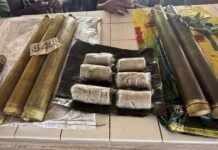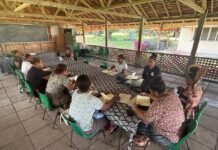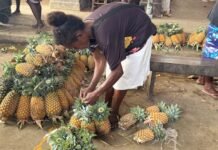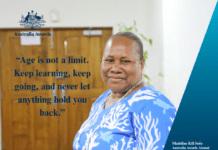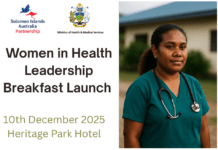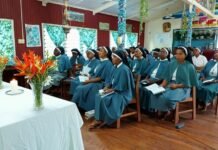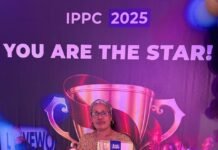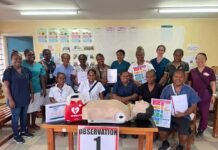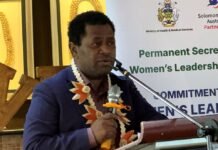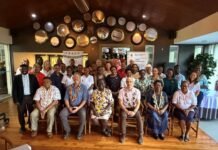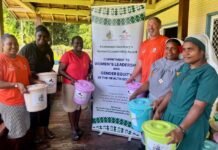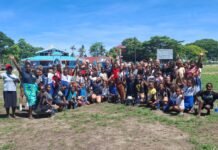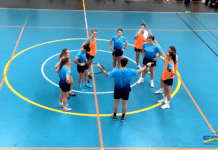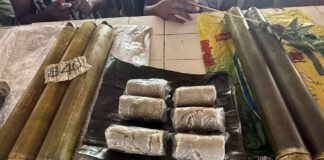
BY JOY OFASIA
MARY Alalo, the Water Security Engagement Lead at the Secretariat of the Pacific Community, has been an advocate for water security resilience in the Pacific Community and is making waves in the fight against climate change at the 10th World Water Forum in Bali, Indonesia.
The 10th World Water Forum provides a unique platform that is organized every three years where the water community and key decision-makers collaborate and make long-term progress on global water challenges.
With the Forum’s theme “Water for Shared Prosperity,” it presents a critical opportunity to unite nations in the pursuit of efficient and integrated strategies that ensure water prosperity for all.
With Alalo’s role as Project Specialist – Climate Adaptation, Disaster Risk Reduction, Project Management, Community Engagement, and Capacity Building Facilitation at the Secretariat of the Pacific Community Climate Adaptation, Disaster Risk Reduction, she has spoken at the 10th World Water Forum in Bali, Indonesia, where she emphasized the urgent need for action to mitigate the impacts of climate change on water resources. She stressed the significance of enhancing engagement in water security for achieving long-term resilience and sustainable outcomes, emphasizing the need for strategic pathways.
“Strengthening engagement in water security is critical to achieving resilient and sustainable long-term outcomes; thus, water security must be featured as a key determinant of resilience with key strategic pathways,” Mary Alalo stressed at the 10th World Water Forum in Bali, Indonesia.
In an exclusive interview with the SOLOMON WOMEN after she recently participated in the 10th World Water Forum in Bali, Indonesia, from May 20 to 21.
Mary said she was part of the Pacific Community (SPC) team that coordinated four Pacific-specific priority water security sessions under the Asia Pacific regional process of the 10th World Water Forum in collaboration with the Australian Water Partnership and the Pacific Resilience Partnership Water Security Technical Working Group.
She said the key messages from the Pacific-specific sessions were the critical importance of sustainable and innovative financing to support resilient and sustainable water security investments in Pacific Small Islands Developing States, addressing key sanitation gaps in the Pacific, calling for a step up in climate-resilient sanitation financing, strengthening multi-sectoral engagement, collaboration, and partnerships between Pacific SIDS and other small island states and development partners on water security action as a key determinant of resilience, and the importance of integrating GEDSI into water security programs.
“I am satisfied that we were able to engage in this 10th World Water Forum because we were able to bring the water security needs of the Pacific to be included in this forum under the Asia Pacific Region with a dedicated sub-region for the Pacific,” Mary said.
She said it was a united Pacific team effort where Pacific Partners attending the forum maximized their engagement by supporting different Pacific sessions either as speakers, chairs/moderators of the session, or being there in person to ensure the water security needs of Pacific Small Islands States were elevated and included in the closing synthesis session of the 10th World Water Forum.
She added that it was so moving to see the Pacific’s Small Island States delegation supporting each other, united in our love to secure the water security of our beautiful blue Pacific continent.
Mary said she felt an urgency for accelerated water security action and to do more because results from the 2020 Joint Monitoring Program conducted by the WHO and UNICEF show the Pacific lagging behind other regions concerning access to safe drinking water and sanitation.
“Not only that, but our small island developing states are on the front lines of combating climate change impacts on our water security as Water is the medium in which climate change impacts are felt (too little water, drought, or too much water, flooding, or too dirty water, pollution). Thus, we must strengthen our engagement in water security as a key determinant of resilience. We must elevate our water security issues and solutions at all levels, where water security becomes a key strategic and resilient priority outcome area.
As the water security engagement lead from the Pacific Community, Mary Alalo’s representation in the 10th World Water Forum in Bali, Indonesia was not only for the Solomon Islands but the Blue Pacific Continent.
“However, as a Solomon Islander, I do share my Solomon Islands experiences and stories growing up in an insecure water community because I have lived the realities of water insecurities and their impact on girls and women who bear the brunt of water collection and the challenges of managing menstrual hygiene where there is too little water, too much water, or too dirty water. Water security is not just a resilient issue or a development issue; it is also a GEDSI issue because of the differential impacts insecure water has on the welfare of girls and women.
“Girls and women miss out on education and economic opportunities when there is insecure water because they bear the brunt of water collection and experience domestic violence when there is no water at home. As a practitioner in the fields of climate change adaptation, disaster risk reduction, WASH, and community-driven development, I have seen the benefits of securing the water security of communities.
“It makes a huge difference in the health, well-being, and livelihoods of households and communities,” she said.
Mary also emphasized that our water security solutions must be innovative, resilient, and sustainable.
“Our water security solutions must be innovative, resilient, and sustainable to ensure our communities have secure access to water security throughout all conditions,” she added.






